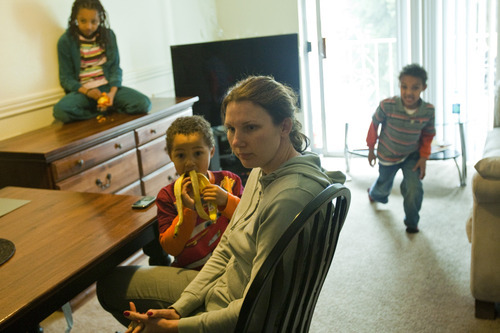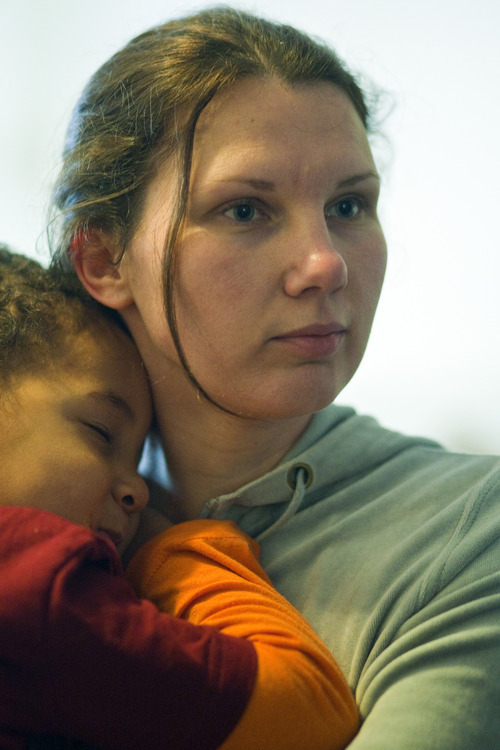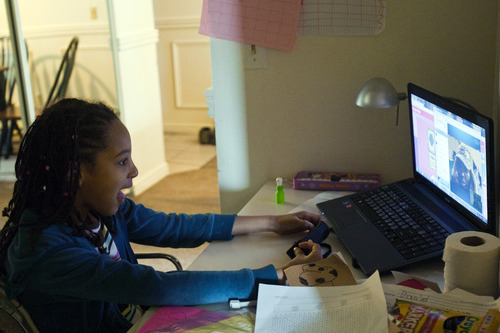This is an archived article that was published on sltrib.com in 2012, and information in the article may be outdated. It is provided only for personal research purposes and may not be reprinted.
Holladay • On their 10th attempt, Vitalina and Harold Lazarus finally won the immigration lottery to come to the United States from Ukraine.
They and their three children landed in Salt Lake City in March, and set about building the life they'd dreamed about for a decade.
Harold Lazarus got two jobs as a certified nursing assistant, and his wife took English classes so she can eventually put her economics degree to use.
The family gets by but would be in a world of hurt if the parents or children were to get sick.
"I always worry about breaking leg," says Vitalina Lazarus, gesturing toward Davian, 3, and Daniel, 5. "They're boys. They always jump."
The couple also has Lina, 8, who on Friday was video-messaging with her father, a medical student who has returned to Ukraine for this semester's classes.
The Lazaruses, say advocates, are just the kind of immigrant family for whom the Utah Legislature should string a safety net.
Yet for the third legislative session in a row, a bill that would allow legal immigrant children to qualify for Medicaid and Utah's Children's Health Insurance Program (CHIP) coverage without waiting five years appears likely to die without a hearing.
Similar legislation passed the Utah Senate in 2009, but failed in the House when there was no money. Since then, Sen. Luz Robles, D-Salt Lake City, has proposed it every year and the bill has never moved out of the Senate Rules Committee to be heard in another committee.
"It should at least have a hearing," Robles said Friday. "These children are moving toward citizenship. I don't understand why when it comes to health care we're penalizing them."
Senate Democrats on the Rules Committee have been trying to move SB111 out this session, but the Republicans, in the majority, have refused. Sen. Margaret Dayton, R-Orem, chairwoman of the committee, did not return emails or a phone call.
Another panel member, Sen. Ralph Okerlund, R-Monroe, said he hasn't discussed it with other Republicans, but considers it an old issue. "We've dealt with this a couple of other times. We're looking for something different."
It's also a matter of money, he said. Until the Legislature gets a better idea of available revenue, it's not eager to look at bills that cost money. "Everyone wants to do everything they can to help kids, but …. it's always a matter of what you can afford."
Sen. Stuart Reid, R-Ogden, also on the committee, said he doesn't remember ever discussing the bill.
According to the state's fiscal analyst, it would cost Utah $372,000 to waive the five-year waiting period for an estimated 800 children who have their green cards but have not yet lived in the U.S. for five years. The federal government would foot most of the bill, matching Utah's money with a federal contribution of more than $1.3 million.
Twenty-four states already provide the coverage, according to the Utah Health Policy Project, which is advocating for the bill.
The bill is also endorsed by Primary Children's Medical Center, the Utah Hospital Association, Utah's PTA, American Academy of Pediatrics and United Way, according to the project.
Charles Pruitt, a pediatric emergency doctor at Primary Children's, appeared before Senate Republicans in a caucus meeting to press for the bill's passage earlier in the week.
He told them about a girl who came to the emergency room with a brain tumor too far gone to treat. Her mother, a legal immigrant, said she delayed seeking treatment because the family had no health insurance, Pruitt said.
Providing health care to children, he said, not only saves lives. "It absolutely saves money in the long run."
Luke Warnock, who met the Lazarus family in Ukraine when he served a mission for the LDS Church there, helped the family find an apartment and checks in on Vitalina Lazarus and the kids while her husband, a native of Tanzania, is back in Ukraine for school. He has another year and a half before he finishes medical school, and he hopes to be able to pass tests in the United States and be accepted into a residency program here.
"Harold was working 80 hours a week when he was here," said Warnock. "It seems reasonable they [lawmakers] would help them with their kids."
SB111 • What's next
P The bill remains stalled in the Senate's Rules Committee, and won't get a hearing unless Republicans agree.







